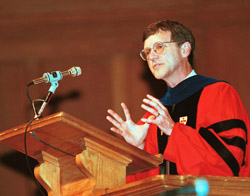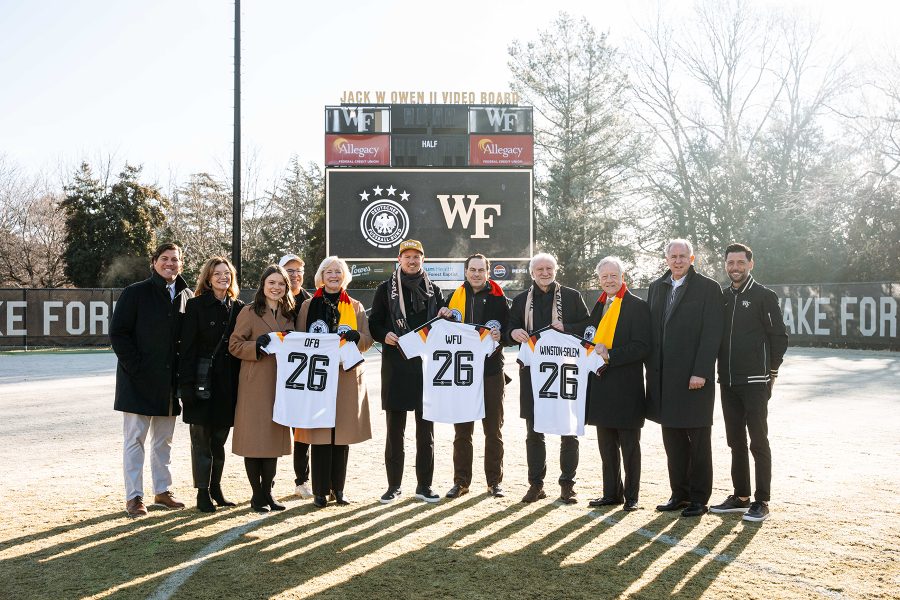Divinity school inaugural convocation address by Bill Leonard
“Not Instruction, but Provocation”:
Doing Theology at a New Divinity School
Bill J. Leonard, Dean
Wake Forest University Divinity School
Inaugural Convocation Address
Wait Chapel
Oct. 12, 1999
 It began in controversy. Andover Theological Seminary, the first official theological school in the United States, was founded in 1808 primarily because, as they said, “Harvard went Unitarian.” Theological studies began much earlier with undergraduates at Yale, Harvard, Princeton and Brown who, once graduated, then “read theology” with a pastor/mentor in a specific congregation. But Andover was the first of its kind, “the West Point of Orthodoxy,” historian Sydney Ahlstrom called it, boasting an “aggressive” faculty, an “enthusiastic” student body and an evangelical influence that spread like wildfire. If the Unitarians had believed in hell, Andover would have scared it out of them. Anyway, orthodox Andover gained so much ecclesiastical clout that the more liberal folk at Harvard responded by founding a Divinity School in 1811. Yale followed in 1822 and the rest is history. From the first, theological seminaries and divinity schools in this country were born of controversy and debate, mirroring the needs and the turmoil of the churches.
It began in controversy. Andover Theological Seminary, the first official theological school in the United States, was founded in 1808 primarily because, as they said, “Harvard went Unitarian.” Theological studies began much earlier with undergraduates at Yale, Harvard, Princeton and Brown who, once graduated, then “read theology” with a pastor/mentor in a specific congregation. But Andover was the first of its kind, “the West Point of Orthodoxy,” historian Sydney Ahlstrom called it, boasting an “aggressive” faculty, an “enthusiastic” student body and an evangelical influence that spread like wildfire. If the Unitarians had believed in hell, Andover would have scared it out of them. Anyway, orthodox Andover gained so much ecclesiastical clout that the more liberal folk at Harvard responded by founding a Divinity School in 1811. Yale followed in 1822 and the rest is history. From the first, theological seminaries and divinity schools in this country were born of controversy and debate, mirroring the needs and the turmoil of the churches.
Harvard Divinity School was itself a seedbed of debate. In 1838 Ralph Waldo Emerson, part Plato, part Icabod Crane, attacked the “corpse cold rationalism” of conservative and liberal alike in his infamous Divinity School address, declaring, as any good Transcendentalist would, that, and I quote: “Truly speaking, it is not instruction, but provocation, that I can receive from another soul. What he announces, I must find true in me, or reject; and on his word, or as his second, be he who he may, I can accept nothing.” For Emerson, truth was not true until perceived from deep within.
On the threshold of a new century, Wake Forest University begins a divinity school and the faculty asked me to say what that might mean. Struggling for a “handle” I lighted on Emerson, less for his Transcendentalism, as fascinating as that may be, than for his wonderful imagery. “Not instruction, but provocation”: it is a dangerous line and an even more dangerous idea. Provocation, the dictionary says, can be “to incite to anger or resentment,” a frightening possibility in any school, and not desired here. But it can also mean, “to stir,” “to challenge,” or “to call forth.” So tonight, let us say that, at least in part, this new school seeks to provide, not simply instruction, but provocation that stirs up students, challenging them, and calling forth from them ideas and issues that help to form their Christian ministry. Learning is always dangerous and difficult to domesticate. Thus my thesis this evening is this: Sooner or later, all good “instruction” involves “provocation,” pressing us beyond our certainty, and ourselves, demanding more than we ever dreamed possible.
As Emerson’s Divinity School address illustrates, theological provocation is nothing new. We are heirs of noble traditions. In a sense, this new divinity school is an effort to provide graduate ministerial education in a university that began in 1834, in part to educate ministers. This audience this evening is filled with friends and colleagues who have invested their lives in theological education through scholarship, struggle and controversy in educational settings and in the church. Amid our celebration we honor you tonight. Some of the finest people I have ever known on this planet are in this room this evening. And we are glad you are here. Like other schools, we will offer basic instruction toward the Master of Divinity degree with its indomitable core curriculum of Bible, history, theology, pastoral care, spirituality, homiletics, supervised ministry and mission.
At first glance, that sounds pretty tame. Even the people who invented that basic curriculum admitted it could be a real snooze. Writing of the courses at the General Theological Seminary in New York in 1856, Episcopal priest Milo Mahan observed, I quote:
Of regular routine work the students have enough: Hebrew, History, Hermeneutics, Systematic Divinity, and the like, are dry and hard studies: and a conscientious teacher, who understands the importance of system, cannot make them otherwise. Without classroom drill, which is not only hard work, but often somewhat of a bore, no solid foundation can be laid.
Do not be fooled, however. The curriculum of this divinity school is anything but boring. It calls us to struggle with issues that burst out of texts and traditions, spiritual exploration and pastoral responses. The intensity of these ideas is sometime beyond measure. And, if the histories of the other theological schools suggests anything for Wake Forest University, it is this: open a divinity school and duck! Controversy will strike immediately, if not sooner.
When Cincinnati’s Lane Seminary split over abolitionism in 1835, the anti-slavery students and faculty transferred to the newly formed Oberlin College where abolitionism, revivalism — you notice how I say that louder — the holiness movement and evangelical feminism went hand in hand. Oberlin began with forty-two students, nineteen of whom were female, a scandalous provocation, then and now. It was the world’s first coeducational college and the first to permit women to study theology. Antoinette Brown, the first woman ordained in America, graduated Oberlin with a theological degree, as did Lucy Stone, class of 1847. Stone’s father refused to fund her education so she raised the money herself by selling berries. After graduation, she preached on the lecture circuit and riots broke out. Sometimes students lead us from instruction to provocation. The Wake Forest University Divinity School beginning with twenty-four full time students, nineteen of whom are female, is debtor to Oberlin and other schools whose courageous faculties and students went before us. They remind us that Christian ministry does not exist in a vacuum. Like them, we are sorting out identities in the midst of changing times.
I’ve said for three years that we are “Christian by tradition, ecumenical in outlook, and Baptist in heritage,” a confession sure to delight and offend everyone. Some are concerned that we are too ecumenical, others that we are not ecumenical enough. Still others wonder what the word “ecumenical” will mean in a new century. And then there is the dreaded “B-word” — Baptist — a word that strikes fear into the hearts of men, women and children from coast to coast. Some fear we are too Baptist even to speak of it, others that we are not Baptist enough. I wonder how we shall understand the meaning of that or any denominational heritage in a new century. Some say we are non-denominational, others that we are inter-denominational, still others that we are post-denominational. One wag suggested we are pan-denominational — we’d support any denomination that would pan out for us. I hope we will simply prepare our students for ministry in churches now compelled to ask those same questions for themselves.
I also suspect, as has already been hinted at this evening, that some of our Wake Forest faculty colleagues may wonder if the term “theological education” is itself paradoxical, if not oxymoronic, an attempt to posit education on the premise of God, the Sacred, and other less than objective claims. We must prove ourselves on this campus.
Likewise, some church-folk still worry that theological education itself is detrimental to faith, warning our students as people have since 1834, “Don’t let them steal your faith up there at Wake Forest.” Sam Jones, the Methodist circuit rider whose Nashville church housed the first Grand Ole Opry, illustrated that long distrust of seminary education. Commenting in the 1890s, Jones warned: “We have been clamoring for forty years for a learned ministry, and we have got it today and the church is deader than it ever has been in history. Half the literary preachers in this town are A.B’s, Ph.D.’s, D.D.’s, LL.D.’s and A.S.S.’s.” Baptists remain suspicious. As an old Baptist once told me: “We don’t care much for an educated ministry, we saw what it did to the Presbyterians.”
Aware of, but (mostly) undaunted by such concerns, Wake Forest University began plans for a new divinity school over a decade ago. Its mission is as follows. First, this is a school of the university; a community of scholars inside a broader community of scholars, providing perspectives which theological education can bring to scholarship, spirituality, and ethics for and with the university at large. Second, this divinity school prepares ministers for churches. The students in this first class speak of their desire to serve churches as Christian ministers. The forms of that ministry will vary, but most know they will be involved in preaching, teaching, counseling, praying with, and guiding congregations or their extended ministries in the church and the world. Third, the divinity school prepares ministers to respond to basic issues of life and death, pain and struggle, joy and celebration in faith communities where many of the old structures, resources, and identities are in “permanent transition.” Fourth, a diverse full-time and adjunct faculty facilitates formation for ministry.
The Divinity School is a strange mix, you must admit. One observer described our faculty as composed of “two feminists, a monk, a controversial expert on religious liberty and two battle-scarred Baptists.” The Classics Department is teaching Greek for us, the Religion Department is teaching Hebrew. By next fall we will have an African American professor of preaching, and a full-time New Testament professor. Two of our Law School colleagues have opened their seminars to our students. Pastoral Care studies are facilitated by the Pastoral Care Center at Baptist hospital and we are working to raise funds for a chair of Jewish Studies. We hope Professor Maya Angelou will drop by and bless us from time to time. We may even get an Appalachian Mountain preacher to stop in occasionally. Our student body is seventy five percent female, with a majority who are Baptists in one kind or another, and there are a lot of kinds. Others are Moravian, Lutheran, Presbyterian, Methodist, and a couple whom, I say, “are keeping their denominational options open.” Is all this a nightmare of cross-disciplinary diversity and theological correctness? Perhaps. But what if it is the future? Can we draw on the best the university has to offer, all in an effort to prepare ministers for churches learning to draw on multiple resources? In some ways we are very diverse, in other ways hardly diverse at all.
Amid instruction, we will encourage our students to come to terms with pluralism and identity, as well as consensus and dissent, dialectics that confront ministers, churches and American cultures on the edge of the new millennium.
Religious pluralism seems a given in American society. There are Buddhists in Berea, Kentucky, Hindus in Jacksboro, Texas (population 2500 — none of you have ever been, but I have. Take my word for it), and an Islamic Center in downtown Asheville, NC. If folks from those religious traditions have found their way to Berea, Jacksboro, and Asheville, they are everywhere! Religion classes at this and other universities have become, for many students, occasions for sorting out their religious heritage in families where multiple religious traditions are the norm. They want to know what it means to have family origins that are Protestant/Catholic, Christian/Jewish, Christian/Muslim, Anglo Saxon/African American, Anglo Saxon/Asian, and how all those traditions relate to THEIR quest for faith. Tomorrow’s ministers must find ways to respond to these changing religious connections.
Pluralism inside is an ecclesiastical given. Many old-line churches now recognize the ordination of ministers in other Christian traditions, permitting pastoral appointment across denominational lines. While ordination inside a specific denomination remains the door to ministry, this generation of ministers may begin in one tradition and move through several others in the course of their vocation.
Pluralism means to many unexpected and “non-traditional” practices. I know Pentecostals who wear clerical collars and elect their own bishops. I also know some people who refer to themselves as Pentecostal Presbyterians, two words no one ever expected to go together. I know one Alabama pastor who preaches in Reeboks every Sunday. He says he tried Nike but he just couldn’t feel the Holy Spirit in the same way.
Christian pluralism flourishes on this very campus. Ten days ago a Jewish filmmaker doing a documentary on Baptists and the Jews interviewed me in my office late at night. Suddenly the sounds from a student-led worship service erupted from the Davis chapel next door. “Are they speaking Hebrew?”, the filmmaker asked. “No,” I replied, “they are speaking in tongues.” This building is full of religious surprises and so is this divinity school.
Three years ago an African-American woman who grew up in Winston-Salem asked me if accepted, would she be welcomed for what she would bring to this divinity school. Tonight she sits here as a part of our entering class. Three years ago a lesbian woman asked me if accepted would she be welcomed for what she would bring to this school. Tonight she sits here as part of our entering class. Last week at a gathering of students another woman expressed thanks for the acceptance and welcome she has received at this new school. She was not sure it would be so since she is different from the other students. She is 74 years old. These three women and their other sister and brother students are welcomed. They are here because of their sense of call, a non-discrimination policy extraordinaire, excellent references, and fine grade point averages. Every one of them is a provocateur extraordinaire. They are shaping this school toward the future through the pluralism of their “voices.”
Pluralism challenges us all. This divinity school began the same week that questions regarding gender and same-sex relations exploded on this campus. As dean of a fledgling school where studying Old Testament, New Testament and Theology are stressful enough, I’d just as soon those issues would have been delayed for awhile — like maybe 100 years. As teacher, historian and Baptist, I know that controversy waits for no one, so we might as well talk about it. Beyond diatribe, beyond accusation, let us listen to ALL our students and faculty, friends and family, for ultimately these questions are familial and pastoral issues. And, through it all, let us declare again as teachers our undying faith in the power of the classroom to change our lives. I do not know how to resolve these issues that divide its churches of our day, I just don’t, but I know we must not fear to speak about them if we value education and learning.
Amid such pluralism, we ask, what does it mean to claim Christian identity? “Doing theology” means living in multiple worlds, preparing students for ministry in a pluralistic environment, while encouraging them in their own search for theological and spiritual identities. Pluralism challenges us to promote tolerance, work for dialogue, and seek the common good. Identity challenges us to find a place (or places) to stand, from which to confront the problems that surround us.
Identity raises questions as old as the church. What does it mean to be Christian? What is the nature of faith? How do we read a text? What is the meaning of baptism and the Supper? How shall churches be gathered and governed? What ideas and beliefs are essential and what are adiaphora, matters of negotiation?
At first glance finding identity seems relatively simple. We choose, as Catherine Albanese says, a creed, a code, a cultus and community and get on with it. But it is more difficult than that. Denominations are not uniform in belief and practice, religious institutions disappoint, congregations can go sour and creeds can be amended, by majority vote. One group’s moral absolute is another’s moral chaos. Many struggle with a combination of dogmas and denominations, spirituality and texts, in the midst of great moral crusades.
And through it all, we acknowledge that such identities are never uniform. A decade ago I taught church history at a Baptist theological seminary in Fukuoka, Japan. The course spanned two semesters of lectures taught via translator, a wonderful Japanese charismatic Baptist who spoke English as well as he spoke in tongues, thank God. One day, a young woman asked a question I shall never forget. “Sensei,” she said — and that wonderful word has no English equivalent — “when the Bible and the mystics talk about losing one’s life in the spirit, I realized that I first learned that idea in Buddhism.” “Sometimes I can’t tell which part of me is Christian and which part of me is Buddhist.” “Is that ok?” “Yes,” I said, “it is ok.” “St. Paul could not always tell which part of him was Jewish and which part of him was Christian. I sometime can’t tell which part of me is Baptist and which part of me is Southern. Welcome to the club.” Her Christian identity was shaped by a multiple influences. For most of us, pluralism and identity get all mixed up together.
In the next millennium how shall we work together? Where shall we find consensus for cooperative endeavor in clothing the naked, feeding the hungry and liberating the oppressed? Sometimes we can’t, won’t or don’t. Divinity Schools, old and new, must provoke churches and individuals to search for consensus, community and the common good. Some find it in great texts, others in denominations. Some gravitate to local congregations, others to prayer and support groups. Some “seekers” have been so hurt by communities–corporate, religious, and familial–that they hesitate to risk.
Consensus is troublesome, messy, intrusive, dynamic, sometimes over-rated, and occasionally misused. The same can be said for dissent, but we need them both. Can dissent be taught? Yes, at least it can be modeled. Martin Luther King, Jr. learned the rubrics of dissent in the black church, in ethics classes at Boston University, and in reading M. K. Gandhi. But it was as a Baptist preacher in Montgomery, Alabama, that he confronted events that took him where he never ever expected to go.
Dorothy Day, mystic, longtime social activist and founder of the Catholic Worker Movement, learned that dissent did not come easily. She wrote:
“I never feel unsure in prison anymore. . . I think I’m absolutely sure of these things — the works of mercy and the nonviolent rebuilding of the social order. I think there has to be a sort of harmony of body and soul, and I think that comes about, certainly for a woman, through those very . . . simple things of ‘feeding the hungry, clothing the naked, and sheltering the harborless.'”
Dorothy Day was a social, though not a theological dissenter, never really questioning the Catholic tradition to which she converted with the first pangs of morning sickness. Dissenters learn to choose their battles.
Some dissent is “over-against”. It is Elijah shaking a boney finger in the establishment’s face and declaring: “Choose you this day whom you will serve.” Some dissent is inside out. Jesus called it leaven, slowly “provoking” a lump of dough into action. Either way there is an explosion.
One other thing, if you intend to be a lifetime prophet, best to work out a permanent relationship with U-Haul. You will be packing the trailer with regularity, and moving on down the road. Dissent is risky and exciting, but, as Baptist preacher Carlyle Marney reminded us, priestliness and the prophetic are inseparable. Marney warned: “It is in the alleys where one ‘priests’ that one arrives at credentials for an occasional prophetic moment.” Justice is wonderful, but it ain’t justice if it’s not accompanied by mercy.
Thus by “doing theology” in a divinity school we are required to ask what such studies mean for ministry in the churches. Ultimately, we must hope that all this research and learning may provoke us to greater understanding of what the ancients called “care of souls.”
In the summer of 1988, I taught in an Appalachian Ministries program in Berea, Kentucky, and certain female students decided to interview a woman holiness preacher as a part of their research project. They found Sister Lydia Surgener, owner of a used clothing store in Pennington Gap, Virginia, and preacher at a little church up a holler in Cranks Creek, Kentucky. When Sister Liddie discovered it, the church was boarded up and seemed dead as a doornail, but, she said, “That church ain’t dead, it’s just asleep.” And, she believed, God told her to wake it up. So, she and her nephew, Junior — wouldn’t you’ve of expected his name to be Junior — went there each Sunday and Sister Liddy would preach and Junior would sing, just the two of them. Gradually, some people started coming and last I heard it was a flourishing congregation.
“Doing theology,” in this or any other school means instructing, indeed, provoking generations of ministers who will “wake up” some churches, “catch up” with others, and perhaps tell a few it’s time to take a little nap. It is declaring, with Sister Liddy, “This church ain’t dead, it’s just asleep.”
As Jesus began his own ministry, he woke up some folk in his own hometown with words from the prophet Isaiah that send us forth tonight. “The Spirit of the Lord is upon me,” he said, “anointing me to announce good news to the poor, to proclaim release for prisoners and recovery of sight to the blind; To let the broken victims go free, to proclaim the year of the Lord’s favour.” (Luke 4:18)
Do you hear the provocation in those words? And the hope? Amen.
Categories: Happening at Wake, University Announcements
Media Contact
Wake Forest News
media@wfu.edu
336.758.5237



